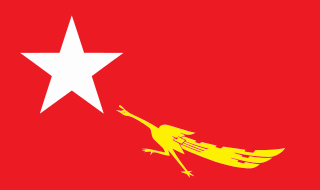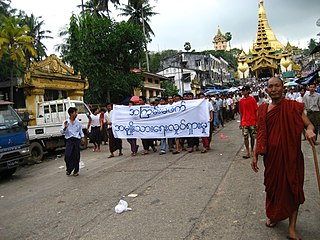 W
WThe internal conflict in Myanmar is a series of insurgencies in Myanmar that began shortly after the country, then known as Burma, gained independence from the United Kingdom in 1948. The conflict has largely been ethnic-based, with several ethnic armed groups fighting Myanmar's armed forces, the Tatmadaw, for self-determination. Despite numerous ceasefires and the creation of autonomous self-administered zones in 2008, many groups continue to call for independence, increased autonomy, or the federalisation of the country. The conflict is also the world's longest ongoing civil war, having spanned more than seven decades.
 W
WThe 1962 Burmese coup d'état on 2 March 1962 marked the beginning of totalitarian rule and the political dominance of the army in Burma which spanned the course of 26 years. In the coup, the military replaced the civilian AFPFL-government, headed by Prime Minister U Nu, with the Union Revolutionary Council, Chaired by General Ne Win.
 W
WThe 1962 Rangoon University protests were a series of marches, demonstrations, and protests against stricter campus regulations, the end of the system of university self-administration, and the policy of the new military regime of General Ne Win. The main events took place in Rangoon, Burma (Myanmar) on 7–8 July 1962. On 7 July 1962, the military regime violently suppressed a student demonstration at Rangoon University attended by some 5,000 students. This resulted in the deaths of more than one hundred, and the arrest of more than 6,000 students according to unofficial sources. However, official government statements put the death toll at 15. In the morning hours of the next day, the military regime blew up the historic Rangoon University Students' Union (RUSU) building, which had been the symbol of the anti-colonial nationalism struggle since the 1920s.
 W
WThe 2011–2015 Myanmar political reforms were a series of political, economic and administrative reforms in Myanmar undertaken by the military-backed government. These reforms include the release of pro-democracy leader Aung San Suu Kyi from house arrest and subsequent dialogues with her, establishment of the National Human Rights Commission, general amnesties of more than 200 political prisoners, institution of new labour laws that allow labour unions and strikes, relaxation of press censorship, and regulations of currency practices. As a consequence of the reforms, ASEAN has approved Myanmar's bid for the chairmanship in 2014. United States Secretary of State Hillary Clinton visited Myanmar on 1 December 2011, to encourage further progress; it was the first visit by a Secretary of State in more than fifty years. United States President Barack Obama visited one year later, becoming the first US president to visit the country.
 W
WThe 2015 Kokang offensive was a series of military operations launched by the Myanmar Army in 2015 in Kokang in northern Shan State, Myanmar (Burma). Several clashes between the Myanmar Army and Myanmar National Democratic Alliance Army had taken place from February to May 2015.
 W
WThe 8888 Nationwide Popular Pro-Democracy Protests, also known as the 8-8-88 Uprisings, or the People Power Uprising, the People's Democracy Movement and the 1988 Uprising, were a series of nationwide protests, marches and civil unrest in Burma (Myanmar) that peaked in August 1988. Key events occurred on 8 August 1988 and therefore it is known as the 8888 Uprising. The protests began as a student movement and were organised largely by university students at the Rangoon Arts and Sciences University and the Rangoon Institute of Technology (RIT).
 W
WThe Arakan Rohingya Salvation Army (ARSA), also known by its former name Harakah al-Yaqin, is a Rohingya insurgent group active in northern Rakhine State, Myanmar. According to a December 2016 report by the International Crisis Group, it is led by Ataullah abu Ammar Jununi, a Rohingya man who was born in Karachi, Pakistan, and grew up in Mecca, Saudi Arabia. Other members of its leadership include a committee of Rohingya émigrés in Saudi Arabia.
 W
WThe communist insurgency in Myanmar was a conflict fought primarily by the Communist Party of Burma and the Communist Party (Burma) from 1948 to 1988. The conflict ended when the armed wing of the Communist Party of Burma disbanded following the Fall of Communism and the ousting of the Burmese socialist dictatorship.
 W
WOperation Dragon King, known officially in English as Operation Nagamin, was a military operation carried out by the Tatmadaw and immigration officials in northern Arakan, Burma, during the socialist rule of Ne Win.
 W
WThe Inn Din massacre was a mass execution of Rohingyas by the Myanmar Army and armed Rakhine locals in the village of Inn Din, in Rakhine State, Myanmar on 2 September 2017. The victims were accused of being members of the Arakan Rohingya Salvation Army (ARSA) by authorities. An investigation by Myanmar's military concluded on 10 January 2018 that there was indeed a mass execution of Rohingyas in Inn Din, marking the first instance where the military admitted to extrajudicial killings during their "clearance operations" in the region.
 W
WThe Kachin conflict or Kachin War is one of the multiple conflicts collectively referred to as the internal conflict in Myanmar. Kachin insurgents have been fighting government soldiers since 1961, with only one ceasefire being brokered between them, which lasted for 17 years from 1994 to 2011.
 W
WThe Karen conflict is an armed conflict in Kayin State, Myanmar. The conflict has been described as one of the world's "longest running civil wars".
 W
WOn 25 August 2017, Hindu villages in a cluster known as Kha Maung Seik in the northern Maungdaw District of Rakhine State in Myanmar were attacked and 99 Bengali Hindu villagers were massacred, allegedly by Muslim insurgents from the Arakan Rohingya Salvation Army (ARSA). A month later, the Myanmar Army discovered mass graves containing the corpses of 45 Hindus, most of whom were women and children.
 W
WThis is a list of insurgent groups in Myanmar. They are officially known as ethnic armed organisations (EAOs) by the government of Myanmar.
 W
WThe Myanmar Peace Centre is an organization to provide technical support to the peacemaking process in Myanmar (Burma), including implementing and managing ceasefire agreements and facilitating dialogue on political issues.
 W
WThe Myanmar peace process refers to the nation led discussions aimed at relieving the internal armed conflict that has been simmering in Myanmar since before it gained independence from Britain in 1948. Many of the events that have taken place can be attributed to tensions surrounding the treatment of the numerous different ethnic minorities. This conflict involves both the Myanmar government and military, and the 16 armed ethnic minorities in Myanmar. In recent years tension between the Myanmar government and the military has been increasing, with the military still holding position as the most powerful political force in Myanmar.
 W
WOpium production in Myanmar has historically been a major contributor to the country's gross domestic product (GDP). Myanmar is the world's second largest producer of opium after Afghanistan, producing some 25% of the world's opium, and forms part of the Golden Triangle. The opium industry was a monopoly during colonial times and has since been illegally operated by corrupt officials in the Burmese military and rebel fighters, primarily as the basis for heroin manufacture.
 W
WThe Rohingya conflict is an ongoing conflict in the northern part of Myanmar's Rakhine State, characterised by sectarian violence between the Rohingya Muslim and Rakhine Buddhist communities, a military crackdown on Rohingya civilians by Myanmar's security forces, and militant attacks by Rohingya insurgents in Buthidaung, Maungdaw, and Rathedaung Townships, which border Bangladesh.
 W
WSaffron Revolution was a series of economic and political protests and demonstrations that took place during August, September, and October 2007 in Myanmar. The protests were triggered by the decision of the national military government to remove subsidies on the sales prices of fuel. The national government is the only supplier of fuels and the removal of the price subsidy immediately caused diesel and petrol prices to increase by 66–100% and the price of compressed natural gas for buses to increase 500% in less than a week.
 W
WThe United Nationalities Federal Council is a coalition of five opposition groups in Myanmar. In 2011, the council was formed by 11 opposition groups that campaigns for the rights of various ethnic minorities in Myanmar. Six of the UNFC's members have successfully made or are in the process of making peace negotiations and permanent ceasefire agreements with the government. The group's armed wing is the Federal Union Army (FUA).